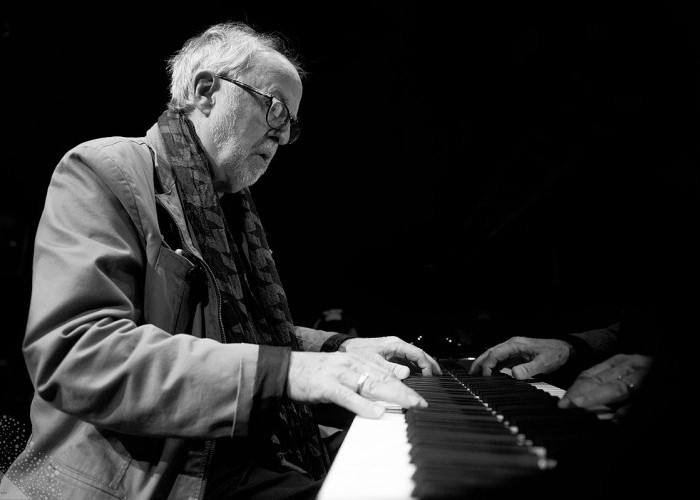Jan 13, 2026 2:09 PM
More Trump-Kennedy Center Cancellations
The fallout from the renaming of the John F. Kennedy Center for the Performing Arts to include President Donald…

Bob James’ 1974 recording of “Nautilus” is frequently sampled by hip-hop artists.
(Photo: Courtesy of Artist)Keyboardist Bob James is one of the most sampled jazz artists of all time, thanks to his 1974 song “Nautilus,” elements of which have appeared on more than 300 hip-hop tracks, by artists such as Run-DMC, Freddie Gibbs and Ghostface Killah. Nearly 30 years after Eric B. & Rakim’s “Let The Rhythm Hit ’Em” incorporated samples of James’ floating Fender Rhodes, “Nautilus” remains a rap staple. “I’m still getting requests very regularly for it,” said the 78-year-old composer. “So, at some point I thought: Why don’t I just go ahead and sample myself?”
That’s exactly what James did on the final track of Espresso (evosound), his new acoustic trio album with drummer Billy Kilson and bassist Michael Palazzolo. On “Submarine,” it’s hard to tell where the “Nautilus” samples end and the musicians’ original work begins, which was James’ intent. “I wanted my listeners to know that I was having fun playing games with the whole concept of sampling,” said James, speaking by phone from his home in Traverse City, Michigan.
“Fun” is the operative word for Espresso, an exuberant studio recording that is James’ first trio album since 2004’s Take It From The Top. Where that record featured reinterpretations of jazz and pop standards, Espresso consists mainly of original material, plus a radical reworking of the Grover Washington Jr. hit “Mister Magic,” one of several tracks James arranged for the late saxophonist while working as an in-house producer and arranger for CTI Records in the ’70s.
During James’ 2017 residency at Blue Note New York, he and his bandmates enjoyed trying to determine whether audiences even recognized their highly syncopated version of “Mister Magic,” which features interlocking 3/4 and 6/8 rhythms. Kilson, a native of Washington, D.C., wanted to sneak in some nods to that city’s ’70s go-go music, a local funk variant. “The first time I heard go-go, it was playing over the ‘Mister Magic’ groove,” Kilson said.
Since 1995, Kilson frequently has toured and recorded with the keyboardist. But in all those years, he’d never seen James more inspired as a songwriter. “He just went on a tear,” Kilson said. “Bob outdid himself on this. It’s really an encyclopedic view in one CD of everything Bob has done for the last 40 years.”
Although acoustic piano is James’ featured instrument, he alludes to other phases of his career through clever use of additional instrumentation. “Topside” echoes his late-’70s forays into what later would be called smooth jazz, with breezy synths and wordless backing vocals buoying his insouciant piano licks. “One Afternoon” harks back to his lush ’70s arrangements for CTI and his ’80s classical experiments, with strings and lovely work by oboist Angela Scates, whom James discovered at the Interlochen Arts Academy near his home in Michigan.
The other young musician featured on Espresso is bassist Palazzolo, a newcomer from Detroit who brings a sense of melody and groove far beyond his years. A 2013 graduate of Wayne State University, Palazzolo first came to James’ attention four years ago through guitarist Perry Hughes. Upon seeing the bassist again a couple years later, “I immediately noticed how much he had progressed and how seriously he was taking his instrument,” James recalled. By the time of the New York sessions last year, Palazzolo was more than holding his own alongside his more experienced collaborators. “He’s challenged me more than I’ve challenged him,” James said.
It was the success of those Blue Note sessions, more than anything, that inspired James to bring this trio into the studio to capture their chemistry. “I hadn’t set out to do a trio record,” James said, but after the Blue Note shows, “I just felt like this was the direction we should go. I like having more focus on the acoustic piano and having a chance to stick my neck out a little bit.” DB

Belá Fleck during an interview with Fredrika Whitfield on CNN.
Jan 13, 2026 2:09 PM
The fallout from the renaming of the John F. Kennedy Center for the Performing Arts to include President Donald…

Peplowski first came to prominence in legacy swing bands, including the final iteration of the Benny Goodman Orchestra, before beginning a solo career in the late 1980s.
Feb 3, 2026 12:10 AM
Ken Peplowski, a clarinetist and tenor saxophonist who straddled the worlds of traditional and modern jazz, died Feb. 2…

The success of Oregon’s first album, 1971’s Music Of Another Present Era, allowed Towner to establish a solo career.
Jan 19, 2026 5:02 PM
Ralph Towner, a guitarist and composer who blended multiple genres, including jazz — and throughout them all remained…

Rico’s Anti-Microbial Instrument Swab
Jan 19, 2026 2:48 PM
With this year’s NAMM Show right around the corner, we can look forward to plenty of new and innovative instruments…

Richie Beirach was particularly renowned for his approach to chromatic harmony, which he used to improvise reharmonizations of originals and standards.
Jan 27, 2026 11:19 AM
Richie Beirach, a pianist and composer who channeled a knowledge of modern classical music into his jazz practice,…